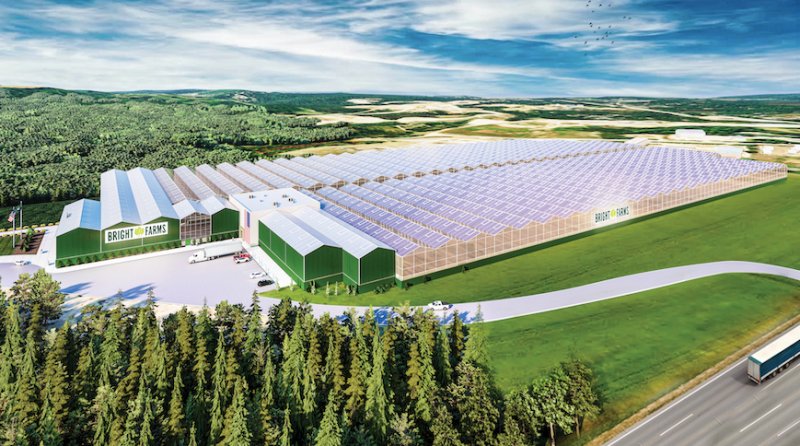 Rendering of BrightFarms’ 14-acre growing hub. Courtesy photo.
Rendering of BrightFarms’ 14-acre growing hub. Courtesy photo.
Six years after being founded in Loudon, lēf Farms, which grows salad greens using hydroponic farming, has been acquired by New York-based BrightFarms. The terms of the deal were not disclosed.
Abby Prior, chief commercial officer at BrightFarms, says the company has a network of local farms with hydroponic greenhouses along the East Coast and into the Midwest, including Illinois, Ohio, North Carolina, Pennsylvania and Virginia. This is Bright Farms’ first foothold in New England.
“We are growing salad greens locally, like lÄ“f, to get fresher, cleaner, more nutritious greens into supermarkets, and we can do it year-round because it is indoors,” Prior says.
As BrightFarms looked to expand in the New England market, Prior says they were aware of the lÄ“f Farms brand and “the great work that the team has done there.” Henry Huntington and Bob LaDue launched lÄ“f Farms in 2015 in a 75,000-square-foot automated greenhouse with a $10 million investment.
lÄ“f began growing—year-round—local, fresh bagged lettuce and greens that were sold to supermarkets, grocers, retailers, restaurants, schools, hospitals and other venues in the Northeast within 24 hours of being cut. It was the first of its kind greenhouse in New England.
Prior says lÄ“f is now growing produce under an acre of glass. BrightFarms will expand it to two acres right away and eventually transform it into a 14-acre growing hub for the region, supplying four million pounds of locally grown lettuce to New England supermarkets including Hannaford, Stop & Shop, Shaw’s, Big Y, Market Basket and Whole Foods.
lÄ“f Farms fits in BrightFarms’ overall strategy of sustainable greenhouse farming, Prior says, pointing out locally grown produce is not only fresher and better for the environment, it also helps with overcoming supply chain issues. “Trucks to ship from California are really limited, and it has become extremely expensive with retailers spending $10,000 a truckload to get from one coast to the other, and it’s bad for the environment. We are driving our trucks just a few hours or much less. The product we are replacing has been coming from California, Arizona and Mexico, and it is on a truck for five to eight days to get to New England. The shortened supply chain improves service to retailers, lowers cost and it’s certainly better for the environment,” she says.
Prior says they are filling current positions in Loudon and looking to hire about 50 people over the next two years. “This is our sixth commercial-scale farm across the U.S.,” she says. “We like to promote from within and have leadership tracks at all our farms.”
The pandemic has not slowed BrightFarms’ growth. Just before the 2020 COVID shutdown, the company opened a 280,000-square-foot greenhouse in Pennsylvania capable of producing 2 million pounds of produce. In July 2020, BrightFarms reported year-over-year sales surged by 40% as it surpassed 2,000 stores carrying its products. In October 2020, BrightFarms secured $100 million in investment for its expansion plans and opened its fifth greenhouse, in North Carolina, this past May. BrightFarms itself was acquired in August by Cox Enterprises, which has a goal of operating the largest network of local indoor farming operations in the country and plans to feed more than two-thirds of the U.S. population by 2025.
For more information, visit lef-farms.com or brightfarms.com.
